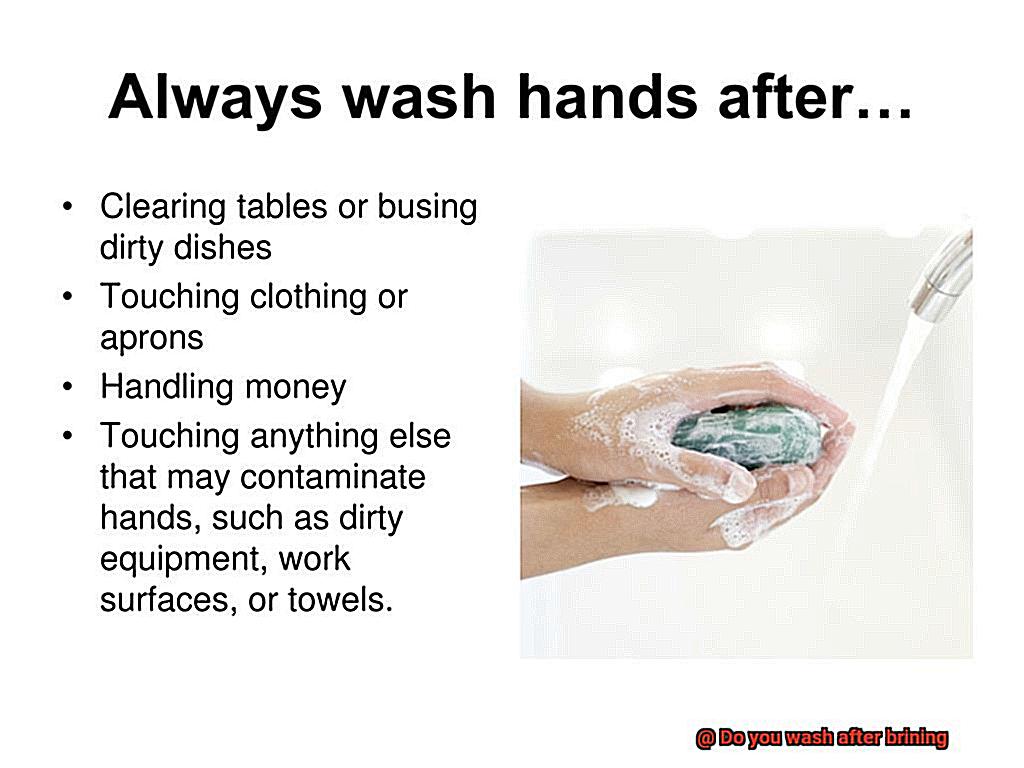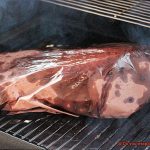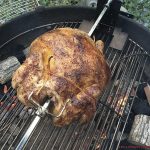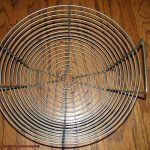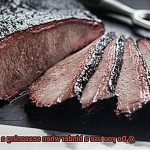Imagine this: you’ve got a mouthwatering brined turkey recipe that’s been passed down through generations, and you’re excited to finally try it out for Thanksgiving dinner. You carefully follow the instructions, letting the turkey soak in the brine for several hours or even overnight. But now that it’s time to take the bird out of its salty bath, you’re left with a burning question – “Should I wash it or not?”
For those who are unfamiliar with brining, it’s a process where meat is soaked in a solution of salt, sugar, water, and other seasonings to enhance its flavor and juiciness. However, whether or not to wash the meat after brining is still an ongoing debate among chefs and home cooks.
On one hand, washing the brined meat can help remove any excess salt and sugar that may have accumulated on the surface. This can result in a more balanced flavor profile for your dish. On the other hand, washing can also strip away some of the flavorful juices that were infused into the meat during brining.
In this blog post, we’ll dive deep into both sides of this debate and explore why each option – washing or not – can be beneficial depending on factors like what type of meat you’re using and your personal preference. We’ll also provide some expert tips on how to properly handle and brine your meat to ensure a safe and delicious meal.
So whether you’re an experienced chef or just starting out in the kitchen, stick around to learn everything you need to know about “Do you wash after brining?”
Contents
Why Use Brining?
Brining involves soaking meat in a saltwater solution, along with other seasonings and spices, resulting in enhanced flavor, moisture, and tenderness.
Firstly, brining helps prevent meat from drying out during cooking. The salt in the brine breaks down the muscle fibers, allowing the meat to absorb more moisture and retain it during cooking. This means that even with high heat or prolonged cooking times, your meat will stay succulent and delicious.
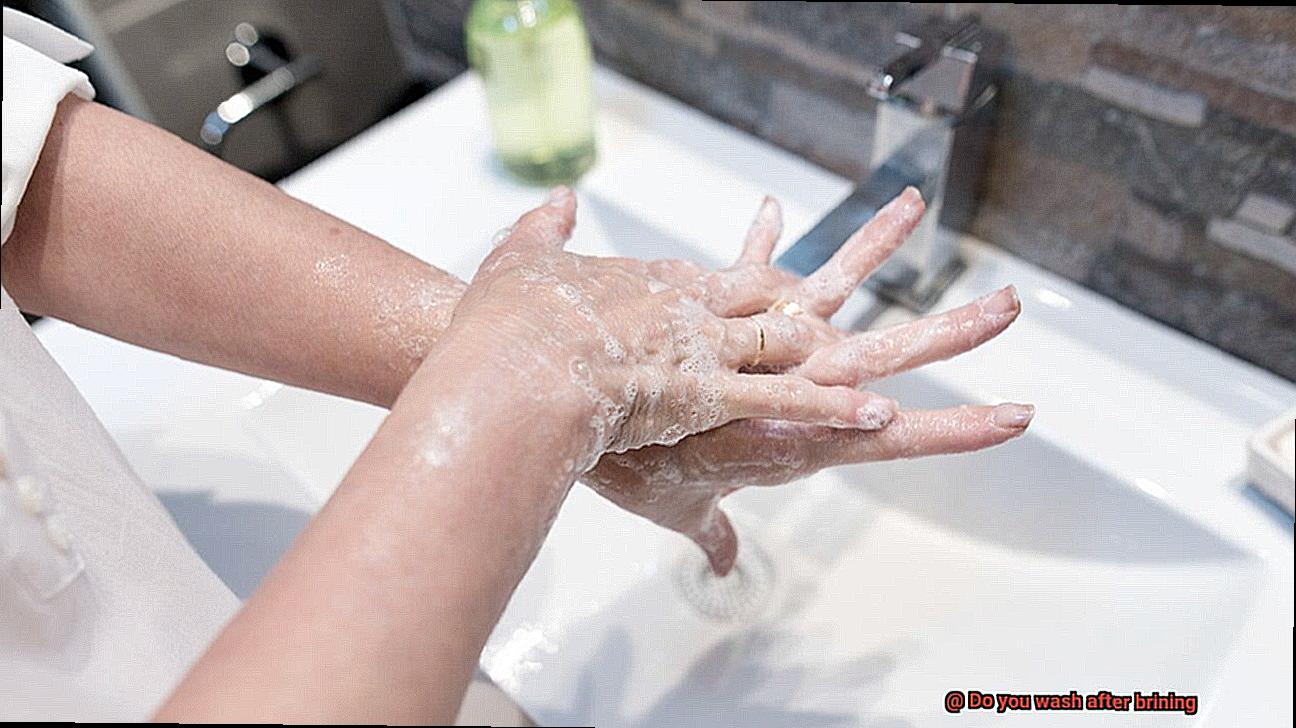
In addition to retaining moisture, brining also infuses meat with additional flavors. By customizing the saltwater solution with herbs, spices, or other seasonings, you can create unique and complex flavor profiles that will take your dishes to new heights.
Furthermore, brining can tenderize even the toughest cuts of meat. The saltwater solution breaks down connective tissue in the meat, making it softer and easier to chew. This means that even less expensive cuts of meat can be transformed into delicious, tender dishes that will impress your guests.
If you’re wondering whether to wash your meat after brining, it depends on personal preference and recipe instructions. Some recipes call for washing to remove any excess salt or sugar on the surface of the meat, but doing so may also remove some of the added flavor and moisture from the brine solution. If you do choose to wash your meat after brining, do so gently and quickly without using soap or cleaning agents.
Is Washing Necessary After Brining?
While brining is a popular technique, many home cooks are left wondering if washing their meat after brining is necessary or not. The answer is not as simple as a yes or no, but rather depends on several factors.
Brining is a process that involves soaking meat in a saltwater solution, typically with additional ingredients like herbs and spices. It helps to infuse flavor and moisture into the meat and tenderize it before cooking. However, the question remains – should you wash your meat after brining?
If you’re following a recipe that specifically instructs you to wash your meat after brining, then it’s best to follow those instructions. However, if your recipe doesn’t mention washing, then it’s up to your personal preference and taste.
Consider these factors when deciding whether or not to wash your meat after brining:
- Saltiness level: Taste a small piece of the meat before deciding whether or not to wash it. If it’s too salty for your liking, go ahead and wash it. If it tastes just right, skip the washing step.
- Time in brine: If you’ve left your meat in the brine for an extended period (over 24 hours), it may be worth washing to remove excess salt.
- Recipe instructions: Follow your recipe’s instructions carefully. If it calls for washing after brining, do it.
If you do choose to wash your meat after brining, ensure you use cold water and do it quickly. Hot water can start cooking the meat, altering its texture and flavor. Pat the meat dry with paper towels before cooking to prevent excess moisture from affecting the cooking process.
Reasons to Wash Meat After Brining
Brining meat is a time-honored method of improving its flavor and texture. However, many people are unsure whether they should wash the meat after brining it. While some argue that washing can remove some of the flavor and spices added during the brining process, there are several good reasons why it may be necessary to wash the meat after brining. Here are five sub-sections that explain these reasons in detail:
Remove Excess Salt
When meat is brined, it is submerged in a saltwater solution that can leave a salty residue on the surface. If this residue is not removed, it can lead to an overly salty taste in the final product, which can be unpleasant for some people. Washing the meat after brining can help remove any excess salt on the surface of the meat, resulting in a more balanced flavor.
Remove Impurities and Bacteria
While brining helps to kill bacteria on the surface of the meat, it is not a foolproof method. During the brining process, the meat may absorb flavors from the seasonings used in the brine, as well as any impurities in the water. Washing the meat before cooking helps to remove any of these unwanted flavors or impurities and reduces the risk of bacterial contamination.
Improve Texture and Appearance
Meat that has been brined can sometimes become slimy or slippery on the surface, which can make it difficult to handle and cook. By washing the meat before cooking, you can remove this slimy layer and improve its texture and appearance. This ensures that your cooked meat looks and feels appetizing.
Personal Preference
While washing may remove some of the flavor added during brining, it ultimately comes down to personal preference and depends on the specific recipe and cooking method being used. Some recipes may call for washing while others do not require it. Knowing your preference will help you determine whether or not to wash the meat after brining.
Type of Meat
Not all meats need to be washed after brining. For example, poultry should always be washed before cooking to remove any bacteria or contaminants, but it may not need to be washed after brining. On the other hand, beef and pork may benefit from a quick rinse after brining to remove any excess salt or impurities.
Reasons Not to Wash Meat After Brining
Brining is a popular method of preparing meat before cooking. It involves soaking the meat in a solution of water, salt, and other seasonings for several hours or even overnight. However, some people may wonder whether it is necessary to wash the meat after brining. The answer is no, and here are several reasons why.
Firstly, washing the meat after brining can remove some of the flavor that was added during the brining process. The salt and other seasonings have already been absorbed into the meat, and washing it can dilute those flavors. This can result in a less flavorful final product, which defeats the purpose of brining.
In addition to removing flavor, washing the meat can also remove some of the moisture that was added during the brining process. This moisture helps to keep the meat tender and juicy during cooking, so removing it can result in a drier, tougher final product.
Another compelling reason not to wash your meat after brining is that it can increase the risk of cross-contamination. When you wash meat, any bacteria present on its surface can be splashed onto nearby surfaces, utensils, or even your hands. This can spread harmful bacteria and increase the risk of foodborne illness. By leaving the meat un-washed after brining, you reduce this risk and ensure that any harmful bacteria are killed during cooking.
Moreover, washing the meat after brining can affect its texture. The salt in the brine works to break down some of the proteins in the meat, resulting in a tender and juicy texture. Washing the meat can rinse away some of those broken-down proteins, leading to a tougher texture.
How to Wash Meat After Brining
Brining is a game-changer when it comes to cooking meat. It’s a simple process that involves soaking meat in a saltwater solution, which helps to tenderize and flavor the meat. However, washing the meat after brining is just as important as the brining process itself. In this post, we will explore the proper steps for washing meat after brining to ensure that you get the most out of your meat.
Step 1: Rinse Thoroughly with Cold Water
The first step in washing meat after brining is to rinse it thoroughly with cold water. This step helps to remove any excess salt or brine solution from the surface of the meat. It’s essential to rinse both the inside and outside of the meat to ensure that all the excess salt and brine are removed.
Step 2: Pat the Meat Dry
After rinsing, pat the meat dry with paper towels or a clean towel. This step helps to remove any excess moisture, ensuring that the meat browns properly when cooked. It’s crucial to have a dry surface on the meat before cooking it.
Step 3: Follow Food Safety Guidelines
Handling meat requires strict adherence to food safety guidelines to prevent the spread of harmful bacteria. Use clean hands and avoid cross-contamination by using separate cutting boards and utensils for raw meat and other foods.
Step 4: Cook Immediately or Store Safely
It’s best to cook the meat immediately after washing it to avoid bacterial growth. If you intend to store the meat, ensure that it is cooked and cooled down before refrigerating or freezing. It’s also essential to store the meat properly in a sealed container or plastic wrap to prevent contamination.
Step 5: Personal Preference
Whether or not you choose to wash your meat after brining is a matter of personal preference. Some people find that leaving the excess salt and brine on the meat enhances its flavor and texture, while others prefer to wash their meat to remove any excess salt and brine solution.
Tips for Washing Meat After Brining
If you’re a fan of brining meat before cooking, you may already know that washing it after brining is crucial to achieving the desired flavors and textures. However, it’s important to wash the meat properly to avoid losing any of the added flavor and moisture. Here are some tips for washing meat after brining:
Rinse with cold water
The first step in washing brined meat is to rinse it under cold running water. This helps remove any excess salt on the surface. Be gentle and use your fingers to rub away any particles.
Soak in fresh water
After rinsing, soak the meat in a bowl or container filled with fresh water for 15-30 minutes. This will help remove any remaining salt and impurities from the meat. If the water becomes cloudy or discolored, change it and repeat the soaking process until the water remains clear.
Pat dry
Once you’ve finished soaking the meat, remove it from the water and pat it dry with a clean kitchen towel or paper towel. This helps remove any excess moisture that can affect the texture of the final dish.
Let it rest
After washing and patting dry, let the meat rest at room temperature for about 30 minutes before cooking. This allows it to come to room temperature and cook more evenly.
Use clean utensils and surfaces
When handling brined meat, make sure to use clean utensils and surfaces to avoid cross-contamination with other foods.
Benefits of Washing Meat After Brining
The debate about whether or not to wash the meat after brining is ongoing. As an expert in this topic, I can tell you that there are several benefits to washing meat after brining.
Firstly, washing the meat after brining helps to remove any excess salt that may have been absorbed during the process. Salt is essential for the brining process, but too much can make your meat overwhelmingly salty and ruin the flavors. By washing off the excess salt, you can ensure that your meat has a balanced and delicious flavor.
Secondly, washing the meat after brining can help to remove any impurities or bacteria that may be present on the surface of the meat. This is especially important if you’ve used a wet brine solution as bacteria thrive in moist environments. By washing the meat, you can reduce the risk of foodborne illness and ensure that your meal is safe to eat.
Another benefit of washing meat after brining is that it can help to improve the texture of the meat. When meat soaks in a brine solution, it can become slightly mushy or spongy due to the osmotic pressure created by the salt and water. By washing off some of this excess water, you can restore the natural texture of the meat and make it more enjoyable to eat.
It’s essential to note that when washing your brined meat, be sure to use cold water and pat dry with paper towels. This will prevent dilution of the flavors while removing excess salt and water.
Drawbacks of Washing Meat After Brining
While some believe that washing meat after brining is necessary, there are actually several drawbacks to doing so.
Firstly, washing off the brine can strip the meat of flavor and moisture that was infused into it during the brining process. Brining is a technique that enhances the flavor and tenderness of meat by soaking it in a saltwater solution to break down its proteins, allowing it to retain more moisture and absorb additional seasonings or marinades. By washing the meat, you’re essentially flushing away all that delicious flavor and moisture, resulting in a less flavorful and less tender piece of meat.
Moreover, washing off the brine can remove any additional seasonings or marinades added after the brining process, leading to an even less flavorful piece of meat. This is because the seasoning doesn’t penetrate the meat’s surface as well after it’s been rinsed.
Additionally, washing meat after brining can increase the risk of foodborne illness. The saltwater solution used in brining can create a breeding ground for bacteria if not handled and stored correctly. Washing off the brine can spread these bacteria to other surfaces, increasing the chances of cross-contamination.
Lastly, washing meat after brining can cause uneven cooking. The excess moisture on the surface of the meat can prevent it from developing a nice crust when seared or grilled, resulting in an unappealing texture and appearance.
edc7ZYF5njQ” >
Conclusion
To wash or not to wash after brining, that is the question. The debate rages on, with some arguing that washing meat can remove excess salt and impurities while others maintain it strips away flavorful juices infused during the brining process. Ultimately, the choice to wash depends on a variety of factors such as personal preference, recipe instructions, and the type of meat used.
Brining is a time-tested technique that elevates flavor and tenderness by soaking meat in a saltwater solution. It helps lock in moisture, infuse additional flavors, and tenderize even the toughest cuts of meat. If you do decide to wash your meat after brining, be sure to do so gently with cold water and pat dry with paper towels.
While washing may seem like a good idea to remove any excess salt or impurities from the surface of the meat, it can also dilute its flavor and texture. Additionally, washing increases the risk of cross-contamination and uneven cooking.
Ultimately, whether or not you choose to wash your brined meat comes down to personal preference. Take a small taste test before deciding whether or not to wash it. Follow recipe instructions carefully but remember that some recipes may call for washing while others do not require it.
In summary, brining is an excellent way to enhance your meats’ flavor profile while retaining moisture and tenderness.

